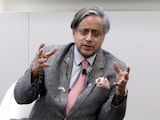File photo of US President Barack Obama.
AP
Washington:
President Barack Obama's State of the Union address on Tuesday will likely turn to emphasis on executive powers he can use to get things done without a gridlocked Congress, dropping last year's focus on a sweeping legislative agenda.
The president will also try to propel fellow Democrats in Congress to re-election in November, an effort complicated by his falling popularity.
"You can be sure that the president fully intends to use his executive authority, to use the unique powers of the office to make progress on economic opportunity to make progress in the areas that he believes are so important to further economic growth and further job creation," White House spokesman Jay Carney said.
In the sixth year of his presidency, public opinion polls put Obama's approval ratings in the low 40s, dramatically down from a year ago. He's taken a big hit over the dismal startup of his signature health care overhaul, which has energized the opposition. Republicans quickly went back on the offensive after being chagrined by their failure to defund the program better known as Obamacare, earning public rebuke for partially shutting down the government in October, which cost the economy billions.
The White House, illustrating Obama's willingness to act on his own in such a toxic political climate, says the president will announce that he will sign an executive order increasing the minimum wage for new federal contracts from $7.25 to $10.10. The modest order would benefit far fewer workers than the number foreseen by advocates of federal contract employees, because it affects only future contracts, not existing ones, and would only apply to contract renewals if other terms of the agreement changed.
Still, the issue dovetails with what will be Obama's broader call for a movement to increase the national minimum wage to $10.10 and for future increases to be tied to inflation. Obama last year had called for an increase in the minimum wage to $9.
Supporters of an increase say the purchasing power of the minimum wage is at its lowest point in decades, and increasing it is a simple, effective way to help the working poor. Pro-business Republicans disagree, saying it will cost jobs, and passing an increase through a divided Congress will be difficult. A push could at least inspire states to increase their own minimum wage - 19 plus the Washington capital district already have one that is higher than the federal minimum.
Though the economy is in far better shape than it was when Obama took office in 2009, unemployment remains high by historical standards. The president has big visions for narrowing the country's acute income inequality, but has been unable to get any help from Congress. The wealthy have mostly recovered since the 2008 fiscal crisis, while many middle income and poor Americans still struggle.
Obama will be trying to set a tone that acknowledges the deep partisan divisions in the U.S. while emphasizing an economic argument that his party hopes will help carry it to victory in November. He will push hard for economic fairness and expanded opportunity, principles Democrats believe will resonate with voters nationwide.
However, with Obama's political coattails growing shorter, he may not be much help to Democrats who will be struggling to hold their Senate majority. Odds on the Democrats regaining control of the House of Representatives from Republicans remain slim, according to analysts.
In the president's message to Congress, an annual American tradition that dates back to George Washington, Obama plans to set out a stark choice: An America where all segments of the population have opportunities to better themselves, versus one where prosperity is disproportionately enjoyed by a select few.
In the run-up to the State of the Union, Obama has persistently sought to focus Americans' attention on trends of inequality and lower social mobility, problems that he's pledging to address in his final years in office. He will lay out plans for executive action he can take without Congress, including job training, retirement security and help for the long-term unemployed in finding work.
"Tomorrow night, it's time to restore opportunity for all," Obama said Monday on the video-sharing site Vine, part of the White House's broad social media promotion of the speech.
The address, delivered before a joint session of Congress and millions of Americans tuning in, typically garners a president his largest audience of the year. It also provides perhaps his best opportunity to persuade skeptical Americans that he still wields substantial power in Washington, before the 2016 race for his successor begins to gain attention.
The president's dose of realism is aimed at avoiding a repeat of 2013, a long year for Obama that ended with a long list of unfulfilled policy goals - including gun control and an immigration overhaul - that gained no traction with lawmakers.
The president hopes he can rally Democrats behind an uplifting theme of equal opportunity that could have broad appeal. In an Associated Press-NORC Center for Public Affairs Research poll last month, 68 percent of those queried said they would like the federal government expend a moderate or great amount of effort reducing the gap between rich and poor.
"People in our country are hungry for action. And what you're going to hear from the president tonight is all about action," senior adviser Valerie Jarrett said on MSNBC
Republicans have been dismissive of the president's go-it-alone approach.
Sen. Roy Blunt suggested that some executive actions might run up against legal challenges, saying Congress should insist Obama "find the Constitution and follow it."
Obama himself has tried to hold expectations in check, telling liberal hecklers who have interrupted him during speeches to call for more executive orders that he can only do so much on his own.
A renewed focus on the economy will offer an opportunity to Republicans to depict Democratic efforts since the 2008 financial meltdown as failures. Republicans, despite their own terrible poll numbers, hold a considerable edge in public trust in their ability to handle the economy.
Finding a theme with cross-party appeal is critical this year for the Democrats, who are defending 21 of 35 Senate seats. Preserving a fragile 55-45 majority is crucial to any hopes of moving even a modest presidential agenda through Congress.
The president will also try to propel fellow Democrats in Congress to re-election in November, an effort complicated by his falling popularity.
"You can be sure that the president fully intends to use his executive authority, to use the unique powers of the office to make progress on economic opportunity to make progress in the areas that he believes are so important to further economic growth and further job creation," White House spokesman Jay Carney said.
In the sixth year of his presidency, public opinion polls put Obama's approval ratings in the low 40s, dramatically down from a year ago. He's taken a big hit over the dismal startup of his signature health care overhaul, which has energized the opposition. Republicans quickly went back on the offensive after being chagrined by their failure to defund the program better known as Obamacare, earning public rebuke for partially shutting down the government in October, which cost the economy billions.
The White House, illustrating Obama's willingness to act on his own in such a toxic political climate, says the president will announce that he will sign an executive order increasing the minimum wage for new federal contracts from $7.25 to $10.10. The modest order would benefit far fewer workers than the number foreseen by advocates of federal contract employees, because it affects only future contracts, not existing ones, and would only apply to contract renewals if other terms of the agreement changed.
Still, the issue dovetails with what will be Obama's broader call for a movement to increase the national minimum wage to $10.10 and for future increases to be tied to inflation. Obama last year had called for an increase in the minimum wage to $9.
Supporters of an increase say the purchasing power of the minimum wage is at its lowest point in decades, and increasing it is a simple, effective way to help the working poor. Pro-business Republicans disagree, saying it will cost jobs, and passing an increase through a divided Congress will be difficult. A push could at least inspire states to increase their own minimum wage - 19 plus the Washington capital district already have one that is higher than the federal minimum.
Though the economy is in far better shape than it was when Obama took office in 2009, unemployment remains high by historical standards. The president has big visions for narrowing the country's acute income inequality, but has been unable to get any help from Congress. The wealthy have mostly recovered since the 2008 fiscal crisis, while many middle income and poor Americans still struggle.
Obama will be trying to set a tone that acknowledges the deep partisan divisions in the U.S. while emphasizing an economic argument that his party hopes will help carry it to victory in November. He will push hard for economic fairness and expanded opportunity, principles Democrats believe will resonate with voters nationwide.
However, with Obama's political coattails growing shorter, he may not be much help to Democrats who will be struggling to hold their Senate majority. Odds on the Democrats regaining control of the House of Representatives from Republicans remain slim, according to analysts.
In the president's message to Congress, an annual American tradition that dates back to George Washington, Obama plans to set out a stark choice: An America where all segments of the population have opportunities to better themselves, versus one where prosperity is disproportionately enjoyed by a select few.
In the run-up to the State of the Union, Obama has persistently sought to focus Americans' attention on trends of inequality and lower social mobility, problems that he's pledging to address in his final years in office. He will lay out plans for executive action he can take without Congress, including job training, retirement security and help for the long-term unemployed in finding work.
"Tomorrow night, it's time to restore opportunity for all," Obama said Monday on the video-sharing site Vine, part of the White House's broad social media promotion of the speech.
The address, delivered before a joint session of Congress and millions of Americans tuning in, typically garners a president his largest audience of the year. It also provides perhaps his best opportunity to persuade skeptical Americans that he still wields substantial power in Washington, before the 2016 race for his successor begins to gain attention.
The president's dose of realism is aimed at avoiding a repeat of 2013, a long year for Obama that ended with a long list of unfulfilled policy goals - including gun control and an immigration overhaul - that gained no traction with lawmakers.
The president hopes he can rally Democrats behind an uplifting theme of equal opportunity that could have broad appeal. In an Associated Press-NORC Center for Public Affairs Research poll last month, 68 percent of those queried said they would like the federal government expend a moderate or great amount of effort reducing the gap between rich and poor.
"People in our country are hungry for action. And what you're going to hear from the president tonight is all about action," senior adviser Valerie Jarrett said on MSNBC
Republicans have been dismissive of the president's go-it-alone approach.
Sen. Roy Blunt suggested that some executive actions might run up against legal challenges, saying Congress should insist Obama "find the Constitution and follow it."
Obama himself has tried to hold expectations in check, telling liberal hecklers who have interrupted him during speeches to call for more executive orders that he can only do so much on his own.
A renewed focus on the economy will offer an opportunity to Republicans to depict Democratic efforts since the 2008 financial meltdown as failures. Republicans, despite their own terrible poll numbers, hold a considerable edge in public trust in their ability to handle the economy.
Finding a theme with cross-party appeal is critical this year for the Democrats, who are defending 21 of 35 Senate seats. Preserving a fragile 55-45 majority is crucial to any hopes of moving even a modest presidential agenda through Congress.















